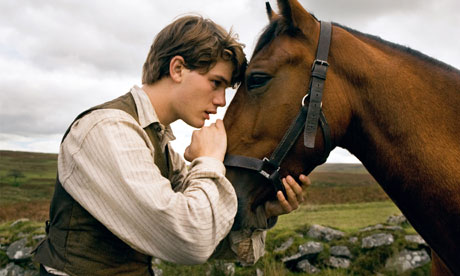
Has the first world war become a kind of eternal martial fantasy, a fictive reimagining of a lost England that never existed in the first place? With Steven Spielberg's War Horse and the BBC's Birdsong recently on our screens, it seems a more urgent yet oddly remote subject than ever, both anodyne and emotive as we recede from its actuality – especially in this, the first decade without a living British veteran of the trenches. Without that living memory, are we busy reinventing the past?
In the lush Devon landscape, only a few miles from the location where Spielberg filmed War Horse, is a real relic of the first world war and what it meant to Britain. Nestling in these indented hills is Seale-Hayne, built in 1914 as an agricultural college, but devoted, in the last year of the war, to treating neurological patients. It is now an activity centre for the differently abled, beautifully run, with an enthusiastic spirit. But it is hard to forget the trauma that coursed through its corridors.
Here quivering, shaking figures were brought, suffering from a fearful new symptom of war – shell shock. The grey stone and red brick of this sprawling, institutional site better echo the reality of the war than Spielberg's oddly glamorised version of history, seen through a golden haze. The Devon seen in his film is a kind of caricature, one that does not allow this landscape, a body imprinted with history, to speak for itself. Seale-Hayne is more evocative of that darkness, for all its bucolic setting.
A unique film record of this place, made by the Pathé Brothers in the last year of the war, shows those grey ghosts, clad in their "hospital blues", as they were subjected to "re-education" and "persuasion", the physical therapies and primitive hypnosis of an age before psychotropic drugs. Brought to Devon from the western front, they were put to work on a model farm and, in a final bizarre scene in the film reel, set to fight one another in mock battles that mimicked those they thought they had left behind.
Watching Spielberg's film last weekend, back to back with Birdsong – the latter threaded through its leading actor's disconcerting stare, a kind of homoerotic fixity – I thought how extraordinary it is that nearly a hundred years after it began, the first world war has yet to end, at least as far as our collective imagination is concerned.
Boys from my nephew's school are already serving in Afghanistan, and the Royal Marines' base in Plymouth, near my house, provides the urgent reality to television and film dramatisations. Perhaps that is the necessary distance we create to separate ourselves from the wars we are still conducting.
In the south-west, as elsewhere, a new generation is dealing with post-traumatic stress disorder. Our fictional wars allow us to ignore such realities. Are we still suffering a collective shell shock, using fiction to obscure, as much as reveal, the past? Is it guilt that prevents us dealing with our sense of national memory? Does such a thing even exist? Perhaps not. But on the edge of Dartmoor, on this grey winter's afternoon, in these green fields overloomed by jackdaw-hung trees, it seems the past has merged into the future, for all that they remain irreconcilable.
• Follow Comment is free on Twitter @commentisfree

